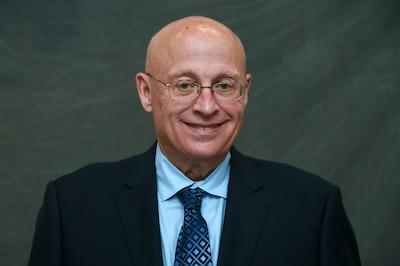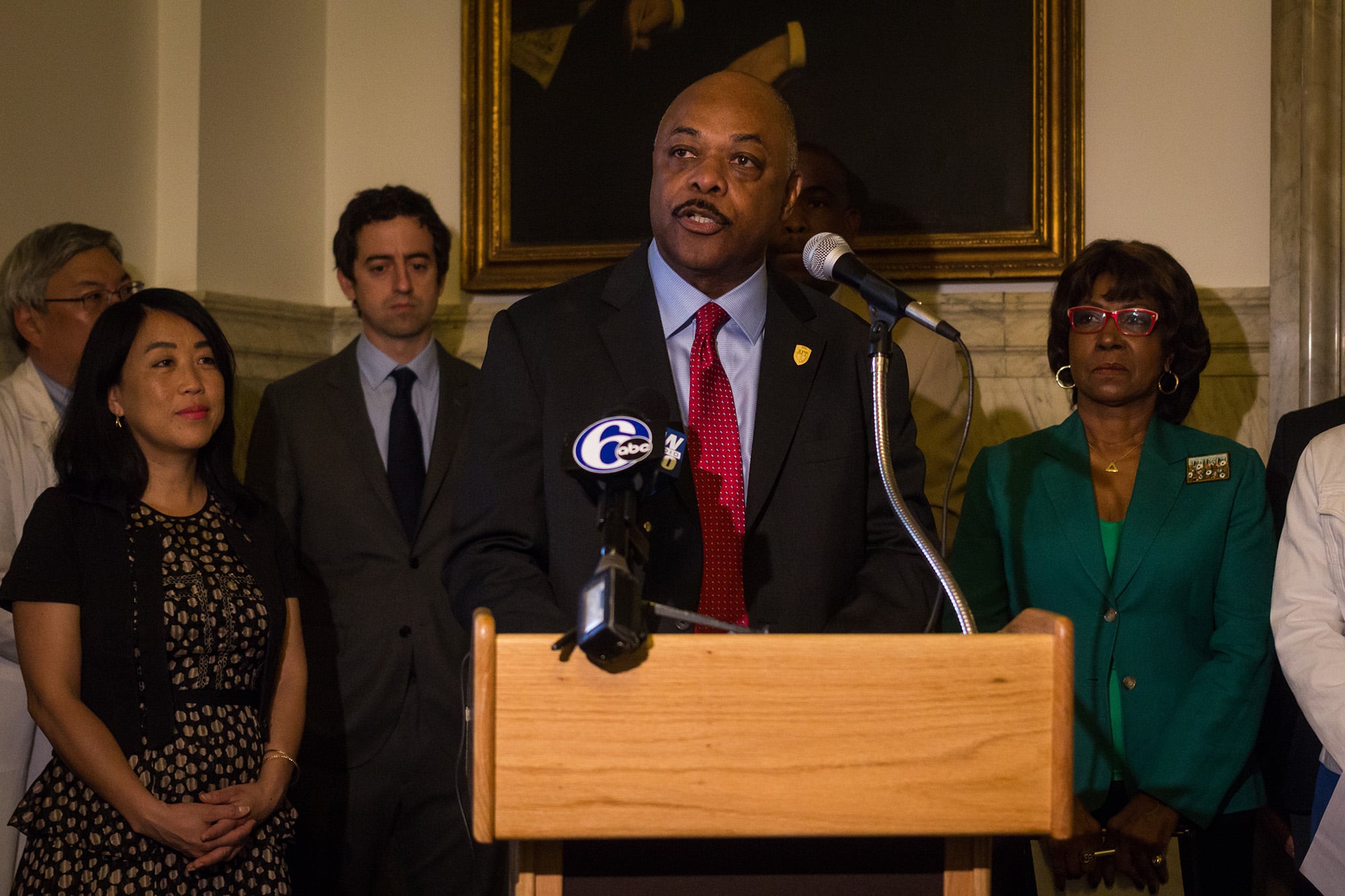Sign up for Chalkbeat Philadelphia’s free newsletter to keep up with the city’s public school system.
The pending retirement of Jerry Jordan as Philadelphia Federation of Teachers president and the ascension of Arthur Steinberg as his replacement ensures the union will continue to be run by members of a group that’s held power for decades.
It also maintains an unbroken string of male presidents of a union that is at least 70% female.
The change in leadership is occurring at a critical time for the school district and the union, which is the city’s largest union and represents 13,600 teachers, nurses, counselors, librarians, secretaries, food service managers, paraprofessionals and other school workers. At its peak, before the advent of charter schools and an overall decline in Philadelphia’s population, it had more than 20,000 members.
Philadelphia’s new mayor, Cherelle Parker, has said she would like to see year-round schooling, and Superintendent Tony Watlington has indicated his interest in the concept. And a state court has ruled that Pennsylvania’s current method of funding education is unconstitutional — a decision that could result in hundreds of millions of more dollars annually for city schools. How that money is used will chart the futures of hundreds of thousands of children and the staff who work with them.
Jordan announced his retirement, which will be effective June 30, on Tuesday. The PFT’s contract expires at the end of August, and the district would have to negotiate any changes in schedules linked with year-round-schooling with the union. The district has also been coping with significant teacher and staff shortages recently.
“It’s terrible, there are a lot of vacancies” for both teacher and paraprofessional positions, Steinberg said in an interview. “A significant number of schools are understaffed.” And Philadelphia’s teacher salaries, especially for experienced educators, lag behind the compensation offered by neighboring districts.
Steinberg, who was previously a special education teacher at Edison High School before becoming a PFT staffer, is currently the president of American Federation of Teachers Pennsylvania. He declined to comment on the union’s stance on Parker’s year-round schooling plan, saying it would be premature. His priorities, he said, “are as they always have been: to engage and listen to the members and take care of their needs.”
Not everyone is thrilled with the hand-off from Jordan to Steinberg, and specifically how Steinberg faced no competition for the presidency. Several teachers associated with the Caucus of Working Educators, which challenged the union leadership in 2016 and 2020, noted in interviews that Jordan took no chances in assuring Steinberg would be the only candidate in contention to succeed him. No one else filed to run because no potential contender besides Steinberg knew of Jordan’s intentions until it was too late, they said.
Jordan sent a letter to his membership announcing his planned retirement just after Tuesday’s filing deadline for the PFT presidential election, which occurs every four years.
His email explained that Steinberg would take over under rules laid out in the union’s constitution. Because he was the only candidate, a vote would be unnecessary, Jordan said.
“This evening, candidates had until 5 p.m. to submit their consent forms and petitions to run” for the presidency and other leadership positions, he wrote. Jordan said that representatives from the American Arbitration Association verified “that only one slate, the Collective Bargaining (CB) Team, submitted their candidacy. I share with you the exciting news and my congratulations to our next president, Arthur Steinberg!”

Steinberg is the son of Jack Steinberg, who was among the PFT’s founding leaders, a longtime treasurer, and head of the union’s Health and Welfare Fund. Members of the union’s CB faction have served as PFT presidents for almost all of the past 40 years. Marv Schuman was president from 1983 to 1990, Ted Kirsch from 1990 to 2007, and Jordan has led the union since then.
Ismael Jimenez, a history teacher for most of his career who is now the district’s social studies curriculum specialist, said he had no doubt that other candidates would have entered the contest this year if they knew Jordan was retiring.
“That would have switched up the equation,” said Jimenez, who ran twice on the Working Educators slate in 2016 and 2020.
Kathleen Melville, who led the Working Educators slate in 2020 as the candidate for president, said it is a “shame that PFT members won’t have a chance to choose the next leader of their union.
“I ran for leadership in 2020 because I believe that members should have a say in who leads their union and what their union is fighting for,” said Melville, who is now a City Council staffer.
‘A persistent voice for the needs of teachers’
The Working Educators caucus was founded in 2014 by a group of teachers who wanted the union to be more active on social justice and equity issues affecting city schools — following the lead of other unions. Kelley Collings, a 23-year teacher who was among the founders of the caucus, also said the group has pushed to change the union’s policies to make it “truly democratic.” (Collings said she was speaking for herself and not on behalf of the caucus.)
The caucus decided in November not to put up a slate of candidates this year, saying instead it would focus on creating a strong contract, building-by-building organizing, and reforming the discipline policy for teacher absences. In the 2016 and 2020 PFT leadership elections, the Working Educators slate got around a third of the vote.
Asked about the timing of Jordan’s announcement relative to the filing deadline, Steinberg said there was no attempt to limit the field.
“The executive board adopts election procedures in December and as soon as that process concluded we sent [filing] deadlines to schools,” he said. “They had the same opportunity to run as any of us did … there was no subterfuge.”
Jordan declined to comment.
Jimenez said in deciding not to run a slate, one factor had been that the caucus felt there had been “a good amount of victories” with the last contract.”
Recent contracts negotiated by PFT included raises and some back pay to make up for a five-year period when the union worked without a contract; that protracted stalemate occurred when the district was under state control. During that time, teachers got no raises at all and no credit for accruing additional experience and educational credentials. Being able to get some of that money back and be made whole was an important victory, Jimenez said.
He also noted that PFT’s leadership team, after being challenged by the Working Educators caucus, had started issuing statements on issues including gun violence and LGBTQ+ issues.
At the same time, Jimenez said “the kind of leadership transition that just happened is “a terrible look for any union, especially teachers and those trying to teach children about democratic values.”
Despite their concern about the succession process and criticism of some of the union’s priorities, many teachers as well as some influential education figures in the city had good things to say about Jordan.
“I would say that he has been a persistent voice for the needs of teachers, and that’s his role as the head of the union,” said Donna Cooper, executive director of the advocacy group Children First and a former official in the mayoral and gubernatorial administrations of Ed Rendell.
While noting that the needs of teachers and those of students don’t always align, she said Jordan was always cordial and respectful.
Former superintendent William Hite called Jordan a “consummate professional” who was “committed to creating better conditions for children in the school district.”
Correction, Jan. 19, 2024: This article has been updated to reflect that Ismael Jimenez ran on the Caucus of Working Educators slate in Philadelphia Federation of Teachers elections in 2016 and 2020. A previous version of the article said Jimenez ran twice on the Collective Bargaining slate. This article has also been updated to refer to Jimenez as the district’s director of social studies. A previous version of the article referred to him as the district’s social studies curriculum specialist.
Dale Mezzacappa is a senior writer for Chalkbeat Philadelphia, where she covers K-12 schools and early childhood education in Philadelphia. Contact Dale at dmezzacappa@chalkbeat.org.







